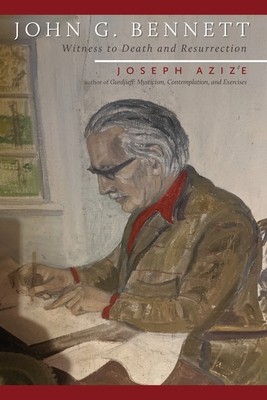
- We will send in 10–14 business days.
- Author: Joseph Azize
- Publisher: Red Elixir
- ISBN-10: 1960090828
- ISBN-13: 9781960090829
- Format: 15.2 x 22.9 x 3.4 cm, minkšti viršeliai
- Language: English
- SAVE -10% with code: EXTRA
Reviews
Description
"I am only a bridge; when you have got over the stream you can kick me away." -Gurdjieff to John G. Bennett
This work advances a thesis about Gurdjieff's mysticism and shows how one of Gurdjieff's most eminent pupils developed the heritage. It also compares John G. Bennett-for whom this is the first biographical study-with other Gurdjieff pupils, notably Ouspensky and Jeanne de Salzmann.
Bennett has been a controversial figure in the Gurdjieff lineage, rising to prominence, as he did, in the generation after Gurdjieff's death. Scholar Joseph Azize scrutinizes Bennett's visions (near-death, out-of-body, and mystical experiences), showing the original ways he witnessed life, death, and resurrection.
Azize also reveals how Bennett was taken advantage of by Idries Shah, and why there's a widespread view among students of Gurdjieff that Idries Shah was a poseur, a pretender to esoteric knowledge, prepared to deceive others when it was to his advantage.
Bennett's later connections with Shivapuri Baba, and his correspondence with David Bohm, are also sure to stimulate more explorations of Gurdjieff-related matters.
EXTRA 10 % discount with code: EXTRA
The promotion ends in 23d.00:25:38
The discount code is valid when purchasing from 10 €. Discounts do not stack.
- Author: Joseph Azize
- Publisher: Red Elixir
- ISBN-10: 1960090828
- ISBN-13: 9781960090829
- Format: 15.2 x 22.9 x 3.4 cm, minkšti viršeliai
- Language: English English
"I am only a bridge; when you have got over the stream you can kick me away." -Gurdjieff to John G. Bennett
This work advances a thesis about Gurdjieff's mysticism and shows how one of Gurdjieff's most eminent pupils developed the heritage. It also compares John G. Bennett-for whom this is the first biographical study-with other Gurdjieff pupils, notably Ouspensky and Jeanne de Salzmann.
Bennett has been a controversial figure in the Gurdjieff lineage, rising to prominence, as he did, in the generation after Gurdjieff's death. Scholar Joseph Azize scrutinizes Bennett's visions (near-death, out-of-body, and mystical experiences), showing the original ways he witnessed life, death, and resurrection.
Azize also reveals how Bennett was taken advantage of by Idries Shah, and why there's a widespread view among students of Gurdjieff that Idries Shah was a poseur, a pretender to esoteric knowledge, prepared to deceive others when it was to his advantage.
Bennett's later connections with Shivapuri Baba, and his correspondence with David Bohm, are also sure to stimulate more explorations of Gurdjieff-related matters.


Reviews